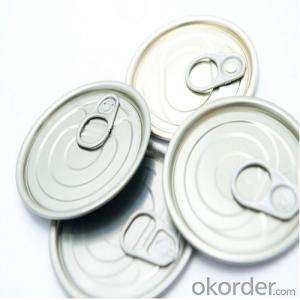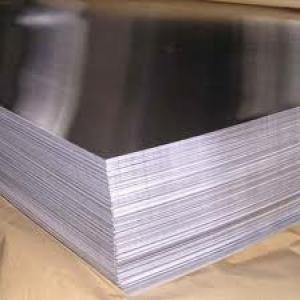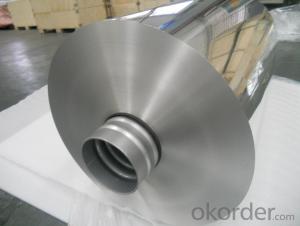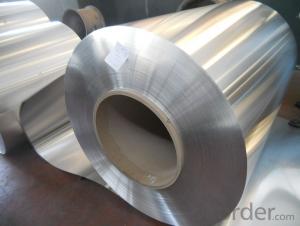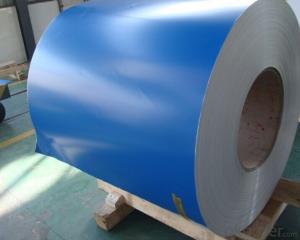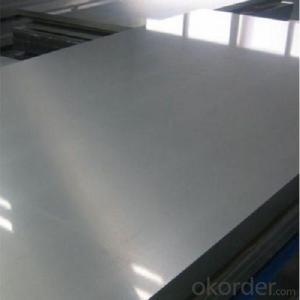Beverage Can Lids with High Quality and Best Price
- Loading Port:
- Shanghai
- Payment Terms:
- TT OR LC
- Min Order Qty:
- 10 m.t.
- Supply Capability:
- 10000 m.t./month
OKorder Service Pledge
OKorder Financial Service
You Might Also Like
Item specifice
1.Structure of Beverage Can Lids with High Quality and Best Price Description:
Aluminum Coil and Sheet for Beverage Can Lidsadopt Japan original painting machine and PPG coating that is exclusively used for tank cap, and professionally produces the coated aluminium coils used for making ring-pull and lid of pop can. All the products are tested by the special instrument, and have passed the FDA recognition of the US. Hot Rolling Thick Aluminum Sheets are widely used for building use, decoration use, making cookware, busing making, shipping building, airplane making and so on。Sizes of aluminum sheet for decoration use: Thickness: 0.3mm~300mm Width: Under 2000mm ( Standard: 1000mm, 1219mm, 1500mm, 1540mm) Length: Under 10000mm. Products commonly used in signs, billboards, building exterior decoration, bus body, high factory wall decoration, kitchen sink, lamp, fan, electronic components, chemical apparatus, sheet processing, deep drawing or spinning hollow ware, welding parts, heat exchangers, Bell surface and plate, plates, kitchen utensils, accessories, safety equipment and other.
2.Main Features of Beverage Can Lids with High Quality and Best Price:
Good mechanical properties.
Easy processing, wearability.
Corrosion resistance
Resistance to oxidation.
3. Beverage Can Lids with High Quality and Best Price Images:
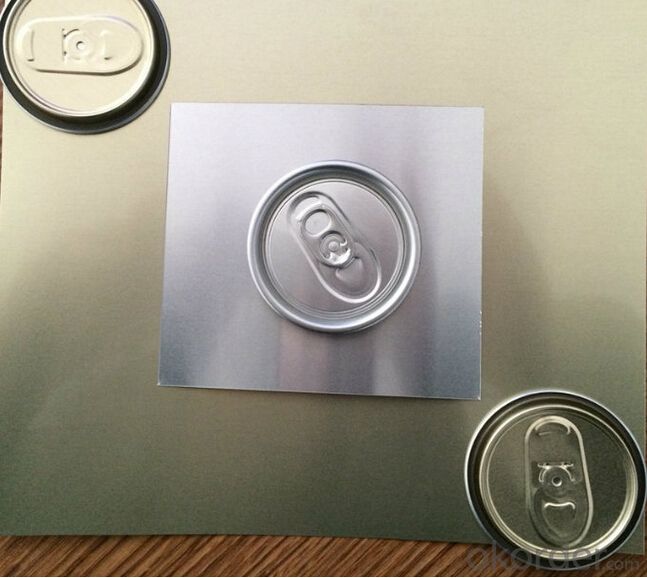
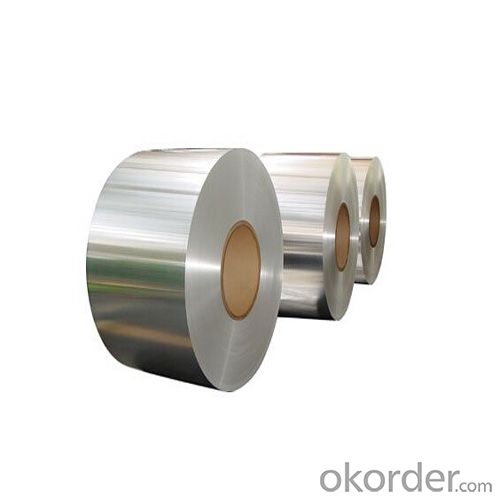
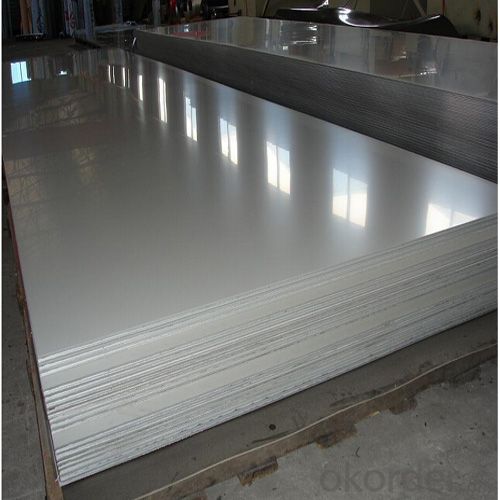
4. Beverage Can Lids with High Quality and Best Price Specification:
| Aluminium sheet | |||||
| Alloy No. | Thickness (mm) | Width (mm) | Length (mm) | Temper | |
| A1050,A1060, A1070,A1100 | 0.2-100 | 20-2200 | 20-8000 | O,H12,H22,H14,H16,H18, H24,H26,etc | |
| 3A21,A3003,A3105,A3004 | 0.2-100 | 20-2200 | 20-8000 | O,H14,H18,H24,etc | |
| A5052 ,A5005,A5083,A5754 | 0.2-100 | 20-2200 | 20-8000 | O,H18,H24,H32,H34,H111,H112 ,etc | |
| A6061,A6082,A6063 | 0.2-200 | 20-2200 | 20-8000 | T4,T6, T651,etc | |
| A8011 | 0.2-100 | 20-2200 | 20-8000 | O,H12,H22,H14,H16,H18,H24,H26, etc | |
5.FAQ
Q1.How long have you been in this product?
A1:More than 10 years.
Q2. What's the minium quantity(MOQ)?
A2. 5 Metric tons
Q3. How long is shipping time?
A3. 7 (ready-made products)-25 days(OEM)
Q4. How do you guarantee the quality?
A4. 1. Cooperating and Exchaning experience with sevral quoted aluminum companies
2. Japanese and Swiss production line and skilled works (regular training and testing)
3. more than 10 years production experience.
Q5. Do you have after sale service?
A5. Yes. Any quality problem occurs within one year, pls take photoes,we will be responsible.
- Q:What is the difference between the alloy 1060H24 aluminum plate and the alloy 1100H24 aluminum plate?
- The difference between the two is very small, 1060 and 1100 are 1 pure aluminum plate, H24 aluminum sheet, that is, the degree of hardness!Specific differences are as follows:Series: 1000 series aluminum alloy represents the 1050, 1060 and 1100 series.
- Q:Are 101 aluminum sheets suitable for chemical transfer piping?
- No, 101 aluminum sheets are not suitable for chemical transfer piping. Aluminum is generally not recommended for handling certain chemicals due to its reactivity and potential for corrosion. It is more commonly used in industries that require lightweight materials and good thermal conductivity, such as aerospace or construction. For chemical transfer piping, it is advisable to use materials that are resistant to corrosion and can withstand the specific chemicals being transported, such as stainless steel, PVC, or high-density polyethylene (HDPE).
- Q:What are the different methods of surface preparation for adhesive bonding of aluminum sheet?
- To ensure a strong and durable bond between the adhesive and the aluminum surface, various surface preparation methods are available. One commonly used method is mechanical abrasion, where the surface of the aluminum sheet is roughened using abrasive materials like sandpaper or wire brushes. This creates a textured surface that enhances adhesive adhesion. Chemical etching is another option, involving the treatment of the aluminum surface with a chemical solution to eliminate any oxide layer and establish a clean and reactive surface. Depending on the adhesive's specific requirements, acids or alkalis can be utilized for this purpose. For adhesives that necessitate a contaminant-free surface, solvent cleaning can be employed. This process involves the use of solvents like acetone or isopropyl alcohol to eradicate grease, oil, or dirt from the aluminum sheet's surface. In addition to these techniques, specialized methods like anodizing and chromate conversion coating can also be utilized. Anodizing entails the creation of a thick oxide layer on the aluminum surface through an electrolytic process, thereby improving bonding properties. On the other hand, chromate conversion coating involves treating the aluminum surface with a chemical solution containing chromates, resulting in the formation of a protective layer that enhances adhesion. Ultimately, the selection of a surface preparation method depends on the adhesive's specific requirements and the desired bond strength. It is crucial to carefully choose and follow the appropriate method to successfully bond aluminum sheet with adhesive.
- Q:There are about 200 holes on the aluminum plate to be machined. There are 100 M12 thread holes, and the rest are 15MM through holes. The tolerance is +0.02. Seeking detailed processing technology, is the first hole or first processing plane, how to control the amount of deformation of the plate, if the milling process can not guarantee flatness, on the grinder, then the 2 surfaces to stay 2MM margin? Are there any 15MM through holes that can be used to maintain tolerances, or do they need to be boring?. Great God advice, the best detail. Aluminum so much done before, no experience, if it does it scrapped.
- Brother, I want to tell you first, the aluminum grinding machine is very rare! Because the aluminum sticky grinding wheel!No money, people are: 1., flying base level, thickness to 26.5 low point! 2. turn the face, press 4 sides, drill rough. The 3. lock bolt is in the hole you hit! Notice here that the lock must be locked one by one! Do you think the workpiece completely tied to lock dead in the fixture, and then processing the thickness to 25.6, the Kong Xian crude drilling reamer locking bolt end processing in place, lock 4. replacement bolts, the original lock bolt hole processing in place! 5., the final flying surface, according to each side of the 0.3 to fly surface, flying surface fixed method, you can use hot melt adhesive or hard rubber mud to fix the workpiece 4 sides and forming the inner hole!The rich person is the vacuum sucker, the base level as much as 26.5, turn over the surface of the vacuum sucker, forming directly!Hope to adopt, typing hard enough!
- Q:Are aluminum sheets suitable for insulation cladding?
- Yes, aluminum sheets are suitable for insulation cladding. Aluminum is a highly versatile and durable material that is commonly used in construction for various purposes, including insulation cladding. Aluminum sheets have excellent thermal properties, making them an effective barrier against heat transfer. They also have a low thermal conductivity, which means they can prevent the transfer of heat between the interior and exterior of a building, resulting in improved energy efficiency. Furthermore, aluminum is lightweight and easy to handle, which makes it convenient for installation purposes. It is also resistant to corrosion, making it a long-lasting option that can withstand various weather conditions. Additionally, aluminum sheets are available in different thicknesses, allowing for customization based on specific insulation requirements. In terms of aesthetics, aluminum sheets offer a sleek and modern appearance, enhancing the overall look of the building. They can be easily painted or coated in various colors to match the desired aesthetic design. Overall, aluminum sheets are an excellent choice for insulation cladding due to their thermal properties, durability, ease of installation, and aesthetic appeal.
- Q:what is better for my 96 mustang gt. porting and polishing my stock heads or getting aluminum heads. also could i do a 3v conversion?
- Port and polish could give you loads of power depending on how big and clean you want to go. Aluminum heads are nice, they are very expensive and will only disperse heat faster. Although they can warp as well if they are under too much heat. If I had to choose, I would choose the port and polish with a roller rocker rail and a high flow electric water pump. I'm sorry but I'm not sure what a 3v is?
- Q:Can aluminum sheets be used for cryogenic applications?
- Yes, aluminum sheets can be used for cryogenic applications. Aluminum has excellent thermal conductivity and can withstand low temperatures, making it suitable for cryogenic environments. Additionally, aluminum's lightweight and corrosion-resistant properties make it a popular choice in various cryogenic applications such as aerospace, scientific research, and cryogenic storage systems.
- Q:Are aluminum sheets suitable for use in harsh chemical environments?
- Yes, aluminum sheets are suitable for use in harsh chemical environments. Aluminum has excellent resistance to many chemicals, including acids, alkalis, and organic solvents. It forms a protective oxide layer on its surface that helps prevent corrosion. Additionally, aluminum is lightweight, durable, and cost-effective, making it a popular choice for various industrial applications in harsh chemical environments. However, it is important to note that the suitability of aluminum sheets in specific chemical environments may also depend on factors such as temperature, concentration, and duration of exposure to the chemicals. It is always recommended to consult with experts or refer to specific chemical compatibility charts to ensure the appropriate selection of materials for a given chemical environment.
- Q:What are the safety considerations when handling and working with aluminum sheets?
- When handling and working with aluminum sheets, it is important to consider a few safety precautions. Firstly, it is crucial to wear appropriate personal protective equipment, such as gloves and safety glasses, to protect against cuts and eye injuries. Secondly, aluminum sheets should be stored and handled in a way that prevents them from falling or causing any crushing hazards. Additionally, it is vital to be aware of the potential for sharp edges on the sheets and take caution to avoid accidental cuts. Lastly, when working with aluminum sheets, it is important to ensure proper ventilation to prevent the inhalation of any aluminum dust or fumes.
- Q:Are aluminum sheets suitable for electrical busbars?
- Electrical busbars can indeed be made from aluminum sheets. Aluminum is extensively used in the electrical industry due to its exceptional electrical conductivity, lightweight properties, and affordability in comparison to metals like copper. Aluminum sheets can be easily shaped and sized to fit the required dimensions for busbars, making them a versatile choice for electrical applications. Moreover, aluminum possesses commendable thermal conductivity, aiding in the dissipation of heat generated during electrical operations. However, it is crucial to acknowledge that aluminum has a lower electrical conductivity than copper, necessitating larger cross-sectional areas to achieve equivalent electrical performance. Consequently, it is vital to consider the specific requirements of the electrical system and seek expert advice to determine the suitability of aluminum sheets for a particular busbar application.
1. Manufacturer Overview |
|
|---|---|
| Location | |
| Year Established | |
| Annual Output Value | |
| Main Markets | |
| Company Certifications | |
2. Manufacturer Certificates |
|
|---|---|
| a) Certification Name | |
| Range | |
| Reference | |
| Validity Period | |
3. Manufacturer Capability |
|
|---|---|
| a)Trade Capacity | |
| Nearest Port | |
| Export Percentage | |
| No.of Employees in Trade Department | |
| Language Spoken: | |
| b)Factory Information | |
| Factory Size: | |
| No. of Production Lines | |
| Contract Manufacturing | |
| Product Price Range | |
Send your message to us
Beverage Can Lids with High Quality and Best Price
- Loading Port:
- Shanghai
- Payment Terms:
- TT OR LC
- Min Order Qty:
- 10 m.t.
- Supply Capability:
- 10000 m.t./month
OKorder Service Pledge
OKorder Financial Service
Similar products
New products
Hot products
Related keywords
